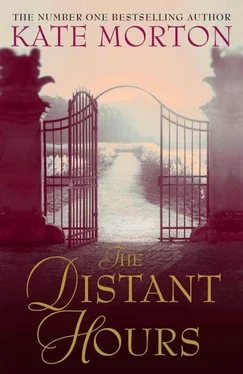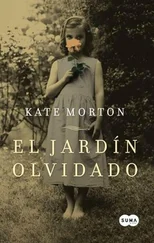‘She’d never let me.’
Rita inspected a dye-stain on her wrist. ‘She wouldn’t need to know.’
My look, I’m sure, said, Huh ?
‘They were amongst Mum’s things,’ Rita explained, ‘came to me after she passed away. Kept them all those years, the sentimental old girl, never matter that they hurt her so. Superstitious, she was, didn’t believe in throwing letters away. I’ll dig ’em out, eh?’
‘Oh… I don’t know, I’m not sure that I should-’
‘They’re letters,’ said Rita, with a dip of her chin that made me feel daft in a Pollyanna sort of way. ‘They were written to be read, weren’t they?’
I nodded. Tentatively.
‘Might help you to understand what it was your mum was thinking up there in her fancy castle.’
The thought of reading Mum’s letters without her knowledge plucked at my guilt strings, but I silenced them. Rita was right: the letters might have been written by Mum, but they’d been addressed to her family back in London. Rita had every right to pass them on to me, and I had every right to read them.
‘Yes,’ I said, only it sounded more like a squeak. ‘Yes, please.’
The Weight of the Waiting Room
And because that’s the way life seems to work sometimes, it was while I sat unpicking Mum’s secrets with the sister from whom she most wished to keep them, that my dad had his heart attack.
Herbert was waiting with the message when I got home from Rita’s; he took both my hands and told me what had happened. ‘I’m terribly sorry,’ he said, ‘I’d have let you know sooner only I didn’t know how.’
‘Oh…’ Panic throbbed in my chest. I pivoted towards the door, then back. ‘Is he-?’
‘He’s at the hospital; stable, I believe. Your mother didn’t say much.’
‘I should-’
‘Yes. Come on; I’ll hail you a cab.’
I made small talk with the driver all the way. A short man with very blue eyes and brown hair beginning to rust towards silver, a father of three young children. And while he told stories of their mischief and shook his head with that mask of mock exasperation parents of small children adopt to degloss their pride, I smiled and asked questions, and my voice sounded ordinary, light even. We came closer to the hospital, and it wasn’t until I’d handed him a tenner and told him to keep the change and to enjoy his daughter’s dance recital, that I realized it had started to rain and I was standing on the pavement outside the hospital in Hammersmith without an umbrella, watching a cab disappear into the dusk while my father lay somewhere inside, his heart all broken.
Mum looked smaller than usual, alone at one end of a bank of plastic chairs, drab blue hospital wall glooming over her shoulder. She’s always well turned out, my mum, dressing from a different age: hats and gloves that match, shoes kept swaddled in their shop boxes, a shelf full of different handbags jostling together, awaiting promotion to complete the day’s outfit. She wouldn’t dream of setting foot outside the house without her powder and lipstick in place, even when her husband’s gone ahead in an ambulance. What a loping disappointment I must be, inches too tall, far too frizzy, lips stained with whichever gloss I happen to excavate first from the detritus of loose change, dusty breath mints and random stuff that live in the depths of my faded tote.
‘Mum.’ I went straight to her, kissed a cheek made deathly cool by the air-conditioning and slid into the bucket seat beside her. ‘How is he?’
She shook her head and fear of the worst lodged lumplike in my throat. ‘They haven’t said. All sorts of machines, doctors coming and going.’ She let her lids fall briefly closed. She was still shaking her head, softly, from habit. ‘I don’t know.’
I swallowed hard and decided not knowing was preferable to knowing the worst, but I thought better of sharing this platitude. I wanted to say something original and reassuring, something to alleviate her worry, make it all OK, but Mum and I had no experience down this road of suffering and consolation, so I said nothing.
She opened her eyes and looked at me, reached to hook a fuzzy curl behind my ear, and I wondered whether perhaps it didn’t matter, that she knew already what I was thinking, how earnestly I wanted to make it better. That there was no need to say anything because we were family, mother and daughter, and some things were understood without being spoken-
‘You look dreadful,’ she said.
I stole a sideways glance and caught my shadowy reflection in a glossy NHS poster. ‘It’s raining out.’
‘Such a big bag,’ she said with a wistful smile, ‘and no room for a little umbrella.’
I shook my head lightly and it turned into a shiver and I realized suddenly that I was cold.
You have to do something in hospital waiting rooms or else you find yourself waiting, which can lead to thinking, which in my experience can be a bad idea. As I sat silently beside my mum, worrying about my dad, making a note to buy an umbrella, listening to the wall clock sweep away the seconds, a horde of lurking thoughts seeped along the wall to brush my shoulders with their tapered fingers. Before I knew what was happening, they’d taken my hand and led me places I hadn’t been for years.
I was standing against the wall of our bathroom, watching my four-year-old self tightrope-walk along the bath tub. The little naked girl wants to run away with the gypsies. She’s not sure exactly who they are or where to seek them, but knows they’re her best bet for finding a circus to join. That’s her dream and it’s why she’s practising her balancing act. She’s almost across to the other side when she slips. Falls forwards, winds herself, lands with her face beneath the water. Sirens, bright lights, strange faces…
I blinked and the image dispersed, only to be replaced by another. A funeral, my gran’s. I’m sitting in the front pew beside my mum and dad, only half listening as the rector describes a different woman from the one I knew. I’m distracted by my shoes. They’re new, and although I know I should be listening better, focusing on the casket, thinking serious thoughts, I can’t stop looking at those patent leather shoes, turning them back and forth to admire the sheen. My dad notices, shoulders me gently, and I wrestle my attention forwards. There are two pictures on top of the coffin: one of the Gran I knew, the other of a stranger, a young woman sitting on a beach somewhere, leaning away from the camera, smile hooked as if she were about to open her mouth and make a quip at the cameraman’s expense. The minister says something then and Auntie Rita starts to wail, mascara spilling black across her cheeks, and I watch my mum expectantly, waiting for a matched response. Her gloved hands are folded in her lap, her attention is fixed on the casket, but nothing happens. Nothing happens and I catch my cousin Samantha’s eyes. She has been watching my mum too and I am suddenly ashamed…
I stood decisively, catching the black thoughts by surprise and sending them scuttling to the floor. My pockets were deep and I plunged my hands down to their seams firmly enough to convince myself I had a purpose, then I paced the corridor paying museum attention to the faded posters touting immunization schedules that were two years out of date; anything to stay here and now and far away from then.
I turned another corner into a brightly lit alcove and found a hot drinks machine nudging the wall. The sort with a platform for the cup and a nozzle that shoots out chocolate powder, coffee granules or boiling water, depending on your predilection. There were tea bags in a plastic tray and I draped a couple into Styrofoam cups, one for Mum and one for me. I watched a while as the bags bled rusty ribbons into the water, then took my time over stirring in the powdered milk, letting the grains dissolve fully before carrying them back down the corridor.
Читать дальше












